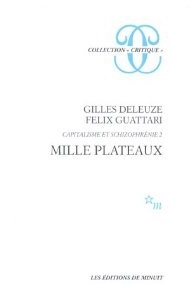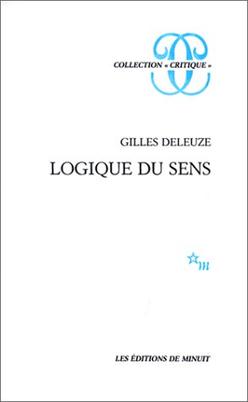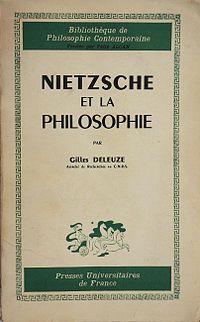
Pierre-Félix Guattari was a French psychoanalyst, political philosopher, semiotician, social activist, and screenwriter. He co-founded schizoanalysis with Gilles Deleuze, and ecosophy with Arne Næss, and is best known for his literary and philosophical collaborations with Deleuze, most notably Anti-Oedipus (1972) and A Thousand Plateaus (1980), the two volumes of their theoretical work Capitalism and Schizophrenia.

Gilles Louis René Deleuze was a French philosopher who, from the early 1950s until his death in 1995, wrote on philosophy, literature, film, and fine art. His most popular works were the two volumes of Capitalism and Schizophrenia: Anti-Oedipus (1972) and A Thousand Plateaus (1980), both co-written with psychoanalyst Félix Guattari. His metaphysical treatise Difference and Repetition (1968) is considered by many scholars to be his magnum opus.
Post-structuralism is a philosophical movement that questions the objectivity or stability of the various interpretive structures that are posited by structuralism and considers them to be constituted by broader systems of power. Although post-structuralists all present different critiques of structuralism, common themes among them include the rejection of the self-sufficiency of structuralism, as well as an interrogation of the binary oppositions that constitute its structures. Accordingly, post-structuralism discards the idea of interpreting media within pre-established, socially constructed structures.
Schizoanalysis is a set of theories and techniques developed by philosopher Gilles Deleuze and psychoanalyst Félix Guattari, first expounded in their book Anti-Oedipus (1972) and continued in their follow-up work, A Thousand Plateaus (1980).

Manuel DeLanda is a Mexican-American writer, artist and philosopher who has lived in New York since 1975. He is a lecturer in architecture at the Princeton University School of Architecture and the University of Pennsylvania School of Design, where he teaches courses on the philosophy of urban history and the dynamics of cities as historical actors with an emphasis on the importance of self-organization and material culture in the understanding of a city. DeLanda also teaches architectural theory as an adjunct professor of architecture and urban design at the Pratt Institute and serves as the Gilles Deleuze Chair and Professor of Philosophy at the European Graduate School. He holds a BFA from the School of Visual Arts (1979) and a PhD in media and communication from the European Graduate School (2010).

A Thousand Plateaus: Capitalism and Schizophrenia is a 1980 book by the French philosopher Gilles Deleuze and the French psychoanalyst Félix Guattari. It is the second and final volume of their collaborative work Capitalism and Schizophrenia. While the first volume, Anti-Oedipus (1972), was a critique of contemporary uses of psychoanalysis and Marxism, A Thousand Plateaus was developed as an experimental work of philosophy covering a far wider range of topics, serving as a "positive exercise" in what Deleuze and Guattari refer to as rhizomatic thought.
Dialogue is a conversational exchange.
A line of flight or a line of escape is a concept developed by Gilles Deleuze and Félix Guattari in their work Capitalism and Schizophrenia. It describes one out of three lines forming what Deleuze and Guattari call assemblages, and serves as a factor in an assemblage that ultimately allows it to change and adapt to said changes, which can be associated with new sociological, political and psychological factors. Translator Brian Massumi notes that in French, "Fuite covers not only the act of fleeing or eluding but also flowing, leaking, and disappearing into the distance. It has no relation to flying."

Cinema 1: The Movement Image (1983) is the first of two books on cinema by the philosopher Gilles Deleuze, the second being Cinema 2: The Time Image (1985). Together Cinema 1 and Cinema 2 have become known as the Cinema books, the two volumes both complementary and interdependent. In these books the author combines philosophy and cinema, explaining in the preface to the French edition of Cinema 1 that "[t]his study is not a history of cinema. It is a taxonomy, an attempt at the classifications of images and signs"; and that the "first volume has to content itself with […] only one part of the classification". To make this division between the movement-image and the time-image Deleuze draws upon the work of the French philosopher Henri Bergson's theory of matter (movement) and mind (time).

The Logic of Sense is a 1969 book by the French philosopher Gilles Deleuze. The English edition was translated by Mark Lester and Charles Stivale, and edited by Constantin V. Boundas.
Gilles Deleuze, a French philosopher, and Félix Guattari, a French psychoanalyst and political activist, wrote a number of works together.

Nietzsche and Philosophy is a 1962 book about Friedrich Nietzsche by the philosopher Gilles Deleuze, in which the author treats Nietzsche as a systematically coherent philosopher, discussing concepts such as the will to power and the eternal return. Nietzsche and Philosophy is a celebrated and influential work. Its publication has been seen as a significant turning-point in French philosophy, which had previously given little consideration to Nietzsche as a serious philosopher.
L'Abécédaire de Gilles Deleuze is a French television program produced by Pierre-André Boutang in 1988–1989, consisting of an eight-hour series of interviews between Gilles Deleuze and Claire Parnet.
Virtuality is a concept with a long history in philosophy, its most notable recent version being that developed by French thinker Gilles Deleuze.

Luis de Miranda is a philosopher and novelist. His earlier books, written in French, have been translated into English, Chinese, Swedish, among other languages. A PhD from the University of Edinburgh, he previously graduated in philosophy at Pantheon-Sorbonne University and in economics at HEC Paris. Since 2018, Luis de Miranda is a philosophical practitioner and member of the Swedish Society for Philosophical Practice, and an academic researcher in Sweden.
Hugh Richard Edward Tomlinson KC is a barrister in England and Wales, an English translator of the philosopher Gilles Deleuze and a founding member of Matrix Chambers. He is a specialist in media and information law including defamation, confidence, privacy and data protection.
Claire Colebrook, is an Australian cultural theorist, currently appointed Edwin Erle Sparks Professor of English at Pennsylvania State University. She has published numerous works on Gilles Deleuze, visual art, poetry, queer theory, film studies, contemporary literature, theory, cultural studies and visual culture. She is the editor of the Critical Climate Change Book Series at Open Humanities Press.
Claire Parnet is a French journalist.
Barbara Habberjam is a prominent English translator of Gilles Deleuze's works. She often collaborates with the translator Hugh Tomlinson.

Cinema 2: The Time-Image (1985) is the second volume of Gilles Deleuze's work on cinema, the first being Cinema 1: The Movement-Image (1983). Cinema 1 and Cinema 2 have become to be known as the Cinema books, and are complementary and interdependent texts.









